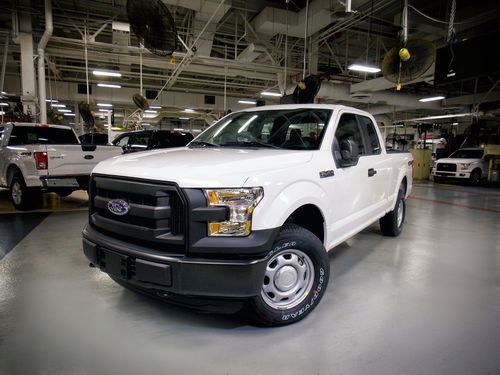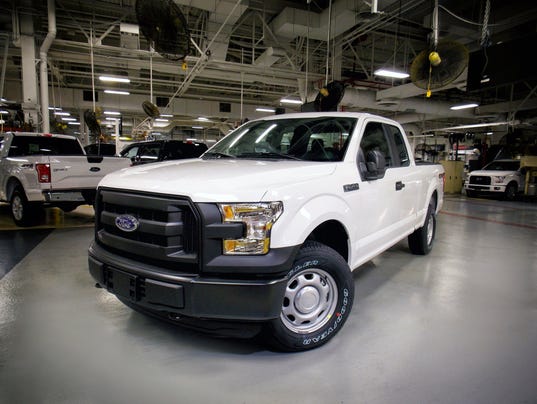But low to moderate gas prices have propelled robust sales of large pickup trucks such as the 2016 Ford F-150 pickup that improved its fuel economy from the prior generation by using aluminum body panels.
(Photo: Ford Motor Company)
Ford Motor Co. said Wednesday afternoon that its year-end earnings were down slightly from analyst projections due to the cost of recalls, lower sales in Asia and commodity costs.
Ford posted a full-year profit for 2017 of $8.4 billion, which will result in $7,500 profit-sharing checks for an estimated 54,000 hourly UAW workers.
Net income was up year over year while net profits were down. Activity in North America carried the day, while European operations, in general, were weak.
Read more:
]]>
]]>
“This has been a very challenging year as well as a year of progress,” Chief Financial Officer Bob Shanks said during a media briefing at company offices in Dearborn. He noted that Ford has $26.5 billion cash on hand, “protecting us” against any economic cycle that may unfold.
Ford also announced a fourth quarter pre-tax profit of $1.7 billion, down 19% from a year ago.
“On one hand, 2017 was by no means a horrible year for Ford, and workers will get pretty fat profit-sharing checks,” said Michelle Krebs, executive analyst at AutoTrader.
“However, Ford did not close out 2017 on a particularly high note, and we expect 2018 will be a more challenging year for the entire industry,” she said. “Our forecast is for 16.7 million new-car sales in 2018, so the fight for a piece of a smaller pie will be competitive. Further, Ford, like the other automakers, will have to address some headwinds like higher interest rates and an onslaught of returning off-lease vehicles that could challenge new vehicle sales.”
She added, “Ford should benefit some in 2018 for freshened sport utilities, like the EcoSport, Edge and Expedition and Lincoln Navigator.
Ford reported a net income of $2.4 billion in the fourth quarter, an increase of $3.2 billion after a loss in the final quarter of 2016. The company saw total full-year revenue of $156.8 billion, up 3% from 2016, and generated primarily by sales in North America.
For 2016, Ford reported revenue of $38.7 billion for the quarter and $151.8 billion for the year, up $2.2 billion from 2015.
Ford was expected to post a fourth quarter adjusted earnings per share of 42 cents on revenues of $37 billion, according to an analyst survey by Bloomberg. Ford delivered 39 cents adjusted earnings per share.
The profit-sharing checks were more generous for 2016 at $9,000 per employee, reflecting a strong sales year. Checks go out in the spring.
The company saw profits generated by its F-Series pickups in the U.S., Canada and Mexico. In September, the average F-Series truck sold for $2,300 more than a year ago, or $45,400. Ford is seeing strong demand for the most expensive packages — Lariat, King Ranch, Platinum – in the Super Duty trucks, and for the Raptor performance version. All F-Series trucks are built in the U.S., Ford notes.
Ford’s revenue worldwide increased 7% to $41.3 billion during the fourth quarter, while its pre-tax profit year over year declined 19% to $1.7 billion.
Ford announced a plan to use its capital more efficiently, invest for growth, focus on electric vehicles and invest some $11 billion to convert product lines to battery electric or hybrid vehicles. Ford has committed to bringing 40 electrified vehicles, including 16 full battery electric vehicles, to market by 2022.
In 2017, Ford announced its joint venture with Zotye to develop and manufacture electric vehicles in China, the fastest-growing consumer market in the world. Technology investments are expected to take a toll on revenue.
When Ford changed its full-year adjusted earnings forecast to $1.78 per share — down from what analysts expected, its stock dropped 7 percent a week ago. Ford expects an earnings decline in 2018 while its competitors and analysts expect a flat year in the automotive industry.
Wall Street investors remain skeptical of the (F) stock despite revenue generated by trucks. Ford tempered its 2018 forecast by saying the cost of materials, specifically steel and aluminum, is expected to rise significantly. But its competitors General Motors and Fiat Chrysler haven’t focused on materials cost in revenue forecasts. New Ram Truck and Chevy Silverado models are expected to crowd the field and potentially cut into the F-series market share
Ford said North America continued to generate most of the profit in the fourth quarter, posting earnings before taxes of $1.6 billion, down 16% compared with the same period last year. The company posted a pre-tax profit of $56 million in Europe and a profit of $5 million in the Asia Pacific region.
Results in South America were a loss of $197 million and a loss of $70 million in the Middle East and Africa.
Ford has faced a series of challenges this year, including shortages of its new Fiesta in Europe, carbon-monoxide issues involving police vehicles, recalls and new CEO Jim Hackett facing Wall Street analysts hungry for specifics related to cost-cutting and strategies for autonomous vehicle technology and ride-sharing.
Ford has pointed to financial challenges including steel costs, the Brexit vote that split the United Kingdom from Europe and negative impacts tied to currency exchange rates.
Wall Street has failed to reward Ford this year as much as its rivals General Motors and Fiat Chrysler.
“We’re freely embracing a revolution,” Hackett said on an investor call in October 2017. “I can assure you we’re committed to transforming our business.”
He highlighted driverless technology and partnerships with Lyft and Domino’s, noting that pizza is a multibillion-dollar industry.
In the third quarter, Hackett said Ford planned to cut material costs by $10 billion and engineering expenses by $4 billion over five years, shift $7 billion of capital costs from cars to SUVs and trucks, and embrace partnerships such as its recently announced alliance with India’s Mahindra Group.
“Ford Motor Company needs to diversify its revenue stream so it’s not so dependent upon the F-Series for profits,” Rebecca Lindland, executive analyst at Cox Automotive, said Wednesday. “Lincoln is beginning a resurgence with the Navigator and the Nautilus, but it has a long way to go in a highly competitive marketplace.”
She continued, “Products like the Ranger and the Ecosport, and making hard decisions like not refreshing the Fusion, will help. They also need to continue to grow in China.”
Lindland emphasized, “Autonomous vehicle strategy is an area of opportunity, but they need to focus on selling more product today, too.”
A new report from the consulting firm Navigant ranked the major players in the emerging self-driving car industry in January 2018. Analysts see GM and Waymo, a Google subsidiary that partners with Fiat Chrysler, as industry leaders, while Ford, Daimler, and Volkswagen Group are strong contenders.
Stock analysts have said they’re hesitant to recommend Ford stock prior to “significant capitulation of profits and restructuring actions that are needed.”
Ford stock has been generally flat, with a 52-week high of $13.48 and 52-week low of $10.47. It closed Wednesday at $12.05.
Industry executives and analysts continue to monitor federal policy for potential changes to the North American Free Trade Agreement that could affect tariffs and taxes and potentially lead to higher prices on new vehicles and fewer sales. Automakers are waiting to hear, too, whether President Donald Trump will apply tariffs to steel and aluminum imports.
“With incentives already at high levels and the truck wars heating up, Ford is setting itself up for an expensive 2018,” said Jessica Caldwell, senior analyst at Edmunds. “While consumer demand for trucks and SUVs shows no signs of slowing down, attractive new entries from Ram and Chevrolet threaten to slow the F-150’s hot sales streak. The investments Ford is planning in autonomy and mobility don’t come cheap, which make strong sales of the company’s backbone truck products even more critical to Ford’s future.”
Ford predicts an upswing in pricing and sales mix in 2018 because of its robust product launches worldwide.
Contact Phoebe Wall Howard: phoward@freepress.com or 313-222-6512. Follow her on Twitter @phoebesaid
Read or Share this story: http://on.freep.com/2FbhX7M

